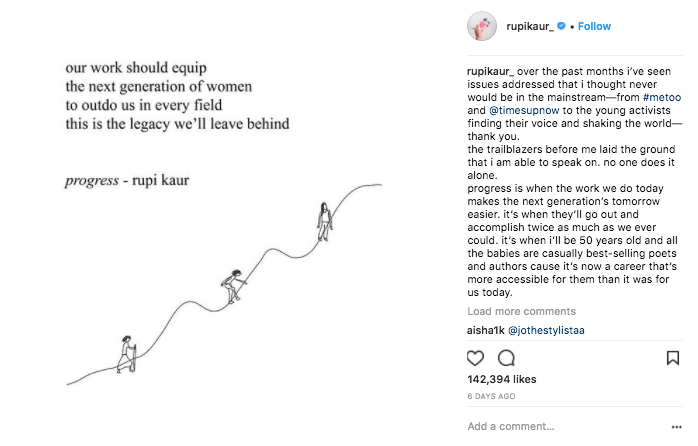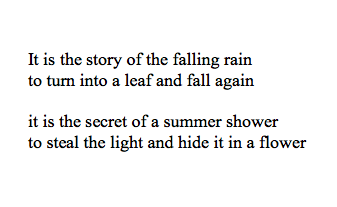Tradition & the Social Media Poet: Alice Oswald & Rupi Kaur
Melissa compares classical poetry and the emergence of the new social media poets, looking to Oswald and Kaur as representatives.
It's easy to dismiss poetry as an obscure, undecipherable way of communicating an idea.
The idea that poetry is difficult has cemented itself in our popular culture, resulting in a significant decline of interest in poetry, particularly for young people; according to Statista, 17,4% of students read poetry outside of class in 2015, as opposed to 31% in 2005.
“Social media platforms are being used as stepping stones for poetry to rise again, with poets who started on social platforms seeing their hard copy books become bestsellers.”
At the same time, interest in social media has been booming for all age groups, and we are now seeing an unexpected result: Social media platforms are being used as stepping stones for poetry to rise again, with poets who started on social platforms seeing their hard copy books become bestsellers. Simultaneously poets like Alice Oswald continue to publish high quality books, preserving their literary status. So what is it about those different types of poets that appeals, and how do they manage to coexist together?
Popular online poets like Rupi Kaur and Hollie McNish exude similar characteristics: they write in simple but hard-hitting styles, using their craft as weapons to address ongoing social issues like sexism, femininity and xenophobia.
Importantly, they are women who reach their audiences through short stanzas and the screens of mobile phones. Kaur has been dominating the bestselling books lists with her latest collection, The Sun and Her Flowers. its back cover showcases progress, a four-line poem that contains neither capital letters nor punctuation, evoking tweets or Instagram captions whilst empowering women:
The stanza doesn’t rhyme, but it rings true for many women, who are leading appeals for change in a bid to no longer stay impassive, and it also rings true for anyone who supports that change.
This is the niche Kaur and other online poets are tapping into, and it is then no surprise that they have garnered fans that scream outside their hotel rooms, much as if they were mainstream celebrities.
Those poets collect thousands of views on social media, with Kaur herself amassing 2.3 million followers. As such, they are using social media not only as a tool for marketing their work, but also to create their own fanbases; this isn't uncommon for pop stars, but certainly is for poets.
Classical poets, by contrast, tend to be less visible on the social media sphere.
Alice Oswald, for example, isn't visible on Twitter, Facebook, or Instagram, but is highly visible in the traditional ways: the high profile prizes she has won throughout the years speak of the literary recognition she has achieved. Just last year, The Guardian reported that Oswald’s public reading of her collection Falling Awake in Toronto claimed the cheers of a thousand people, telling us that the classical does indeed appeal, even if it is not as extravagant or flashy.
Falling Awake’s opening poem, A Short Story of Falling, is structured in couplets throughout and uses nature to reflect on the human experience:
The first couplet works in ten syllables per line, while the second follows an eleven syllables structure. On a technical level, Oswald’s poetry seems more polished that that of Kaur, and perhaps this is the primal difference between classical poets and online poets: one side privileges intricate stanzas and imagery, while the other strips down its stanzas to leave only the message, bright and raw. In that way, they appeal to different demographics, reminding of the divide between pop music fans and opera lovers.
“Time will tell whether social media-driven poetry is a fleeting trend – or if this is a new normal, a way for poets to develop in conversation with their audiences and build careers within a new literary culture. ”
Online poets suit, in a sense, our increasing fluency in fast, straight-to-the-point experiences, and our desire for the literary to engage the stuff of daily life, including our wired and social worlds. Their audiences are more likely to be younger, social media-savvy readers who don't necessarily demand the traditional from their poetry.
Oswald and other classical writers are perhaps in some sense less accessible--either by platform or by style--but answer the desire for poetry that is housed in a literary tradition that we understand.
Time will tell whether social media-driven poetry is a fleeting trend – or if this is a new normal, a way for poets to develop in conversation with their audiences and build careers within a new literary culture.
by Melissa Saryazdi





